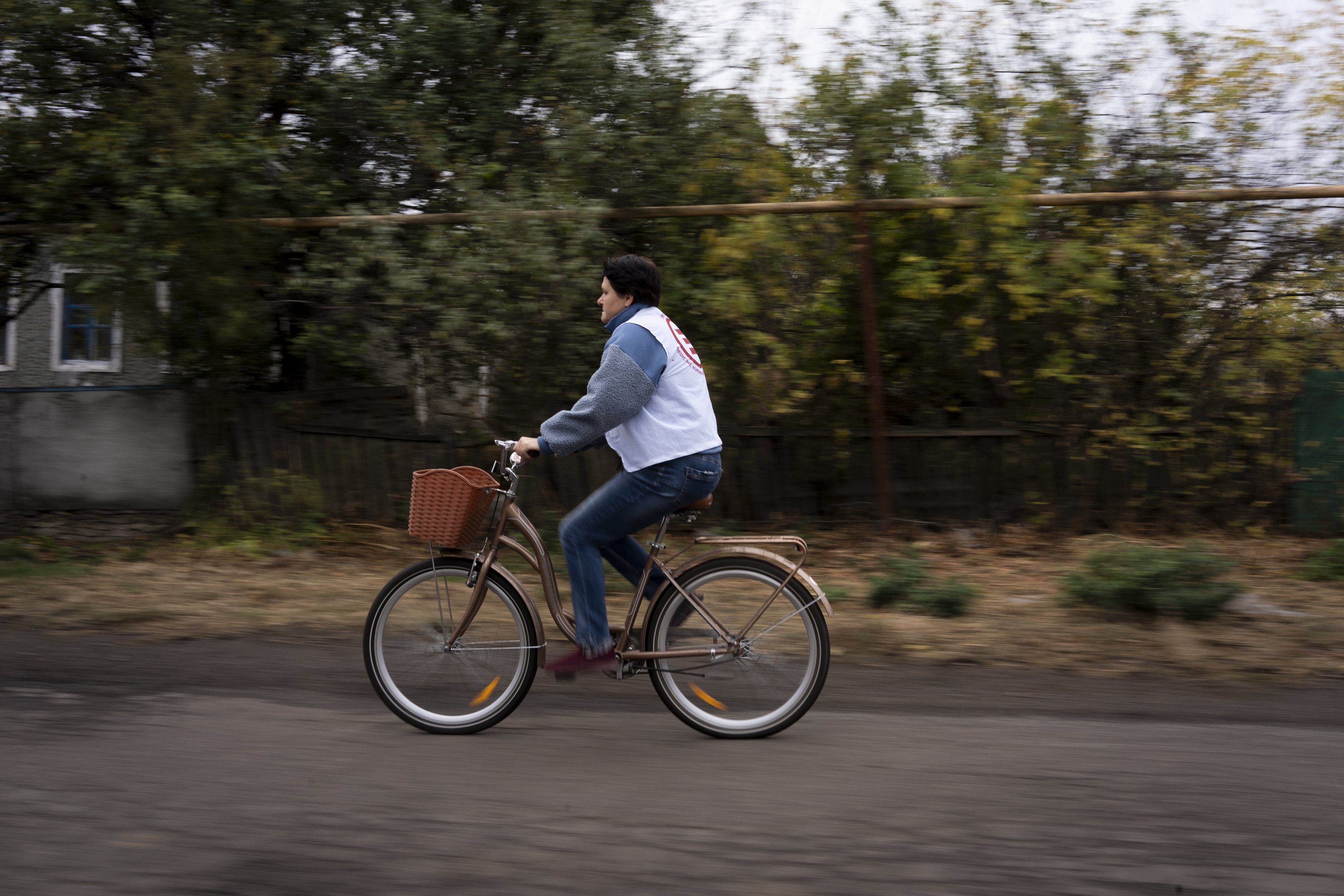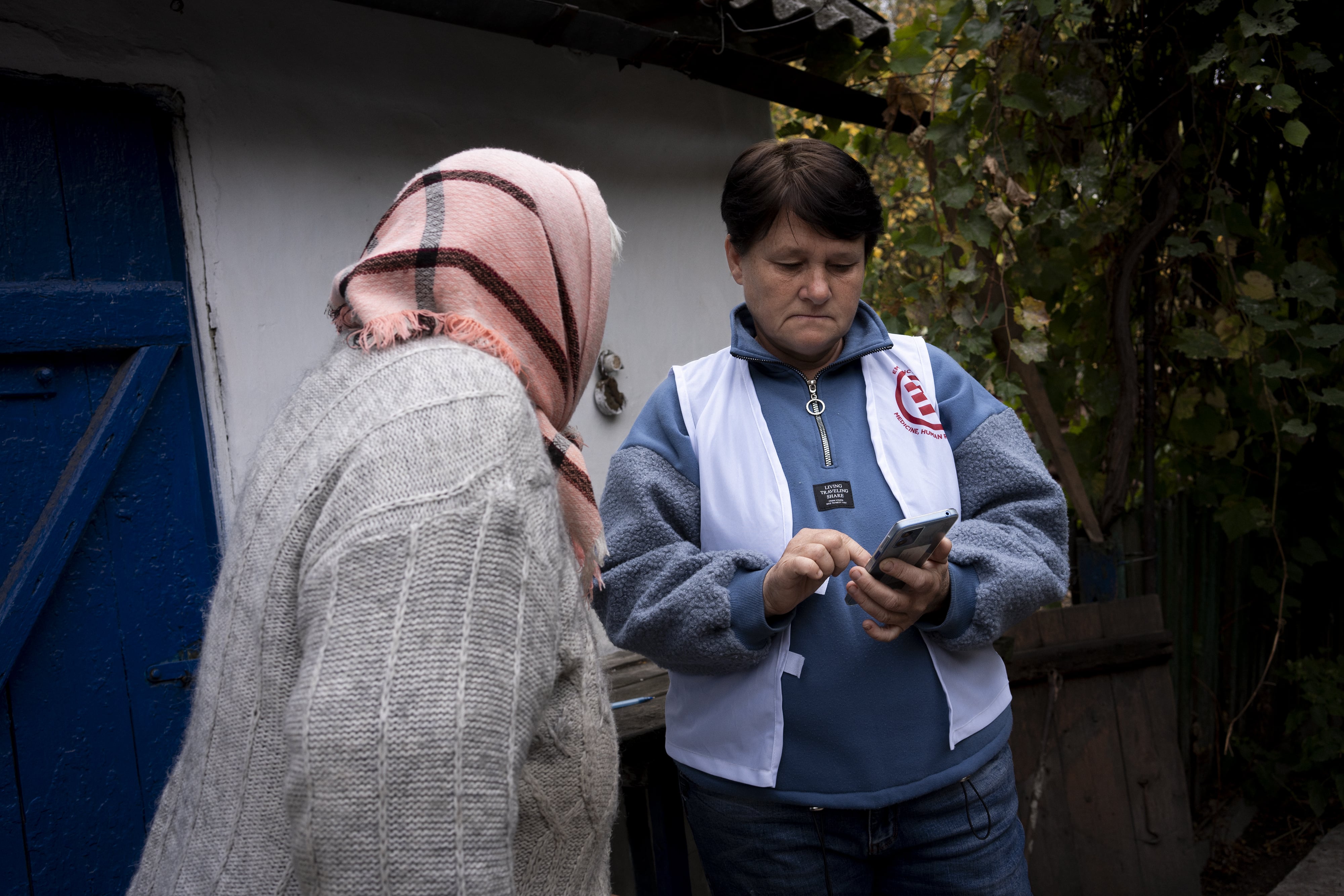
February 24, 2022, marked the beginning of a new reality for millions of Ukrainians. For Natalia Yakovenko, that day meant the end of every certainty.
“Explosions, panic, fear, phone calls—everything merged into a single, bitter reality. I will never forget the feeling that the world had split in two and that the future, which once seemed so clear, had vanished into uncertainty in an instant.”
Today, Natalia works as a Community Health Worker (CHW) in the Donetsk oblast, a region where the war has destroyed hospitals, leaving thousands without access to healthcare. She works with Emergency as part of a program supported by AICS, aimed at restoring medical services in areas reclaimed by the Ukrainian army.
Every day, she travels through the villages of Busynivka, Maryevka, Myrna Dolyna, and Novostepanivka, cycling for kilometers to bring assistance to those who can no longer reach a doctor. It wasn’t an easy start: during her job interview, she was asked if she could ride a bicycle. She hesitated before answering no. “Maybe they won’t hire you…” her friends told her. But she was selected and learned. Now, her work is essential for the population remaining in the most isolated areas.
“At first, it seemed complicated, but now everything is much easier. When I return for the second round, people already know what to answer and how to help us collect the necessary information.” Using her phone, she gathers health data, monitors the population’s well-being, and provides a first level of care.
In Lyman, the closest city, the entire healthcare system collapsed after the Russian occupation and subsequent Ukrainian recapture. Hospitals were devastated, medical personnel fled, and residents lost access to treatment. Here, AICS funded Emergency’s intervention, enabling the purchase of three semi-mobile clinics and the recruitment of local healthcare personnel to provide free medical assistance.
Natalia meets people every day who live in extreme vulnerability. Many elderly people have been left alone, with no family to care for them. “What they need most, sometimes, is just someone to listen to them. They are like children in need of attention. They always welcome me with open arms, and that makes me realize how important the work we do is.”
Among the stories she has collected, one has particularly stayed with her: that of S., a man who risked his life in 1986 to contain the consequences of the Chornobyl disaster. He worked as a driver and was sent into the exclusion zone to transport liquidators, power plant workers, and evacuees. The risk was enormous, the protection minimal, but like thousands of others, he did what was necessary. Years later, he moved to Maryevka, where he built a quiet life—until the war once again took everything from him. Now, Natalia is his only healthcare contact.
Sometimes, her intervention has been critical. One evening, she received a call from an 85-year-old woman who wasn’t feeling well. When she arrived, Natalia immediately realized the situation was serious: her blood pressure and sugar levels were dangerously high. She quickly called a doctor and a medical assistant, ensuring the woman received immediate care. “In those moments, I understand even more how essential our work is. It’s not just about medical support—it’s about being there when people are most vulnerable.”
Beyond her professional commitment, Natalia is also fighting a personal battle. More than ten years ago, she took in her niece, who was left alone at the age of three. The war and family separations have affected many people, and she, too, found herself having to protect someone. Today, the girl is 13 and has found solace in writing. “I have always encouraged her to write whenever her heart was filled with feelings too difficult to handle.” But despite everything, reality remains harsh: she hasn’t seen her parents in years and doesn’t know if she ever will.
As Natalia continues her work in the field, Emergency’s project moves forward with the goal of providing medical assistance to the communities most affected by the war. The semi-mobile clinics, purchased with AICS support, are bringing healthcare to the most remote areas, offering basic medical services and coordinating with the remaining operational hospitals.
The initiative is part of the emergency response funded by Italian Cooperation, supporting 26 humanitarian projects in Ukraine and reaching nearly one million beneficiaries.
